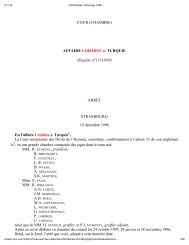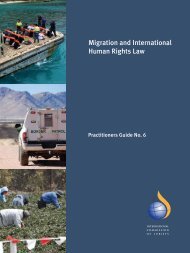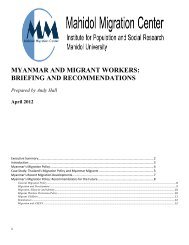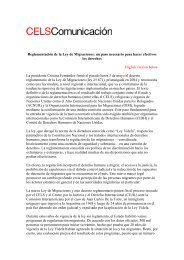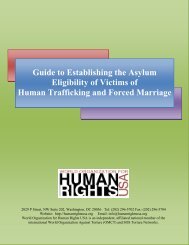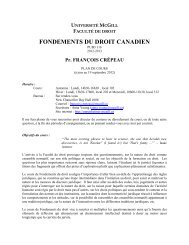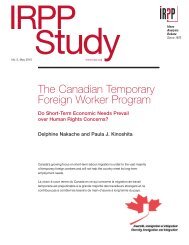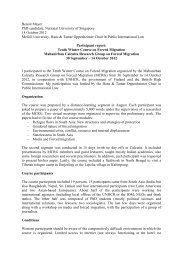Preventive Detention, Suspected Terrorists, and War
Preventive Detention, Suspected Terrorists, and War
Preventive Detention, Suspected Terrorists, and War
Create successful ePaper yourself
Turn your PDF publications into a flip-book with our unique Google optimized e-Paper software.
COLE FINAL<br />
7/1/2009 12:43 AM<br />
702 CALIFORNIA LAW REVIEW [Vol. 97:693<br />
hostile to the United States. 32 The law presumes that any national of a country<br />
with which we are at war poses a potential danger <strong>and</strong> does not require any<br />
individualized determination beyond ensuring that the individual in question is<br />
in fact a national of the enemy country.<br />
Since shortly after 9/11, federal law has also contained a preventivedetention<br />
statute that has never been employed, <strong>and</strong> therefore never judicially<br />
tested. Section 412 of the USA PATRIOT Act authorizes the Attorney General<br />
to detain foreign nationals he certifies as terrorist suspects without a hearing<br />
<strong>and</strong> without a showing that they pose a danger or a flight risk. 33 They can be<br />
held for seven days without any charges, <strong>and</strong> after being charged, can<br />
apparently be held indefinitely in some circumstances, even if they prevail in<br />
their removal proceedings by obtaining “relief from removal.” 34 The Attorney<br />
General need only certify that he has “reasonable grounds to believe” that the<br />
individual is “described in” various antiterrorism provisions of the Immigration<br />
<strong>and</strong> Nationality Act (INA), which are in turn extremely expansive. 35 The statute<br />
does provide for immediate habeas corpus review of the detention, 36 <strong>and</strong><br />
perhaps for that reason, the government has yet to invoke this authority.<br />
As a practical matter, the Constitution’s Suspension Clause also implies a<br />
de facto preventive-detention authority in very limited circumstances. It<br />
guarantees the right of detained persons to seek judicial review of the legality<br />
of their detention, but also provides that in “times of Rebellion or Invasion,”<br />
where public safety requires it, Congress may suspend the writ of habeas<br />
corpus. 37 While this provision does not authorize preventive detention as such,<br />
it acknowledges Congress’s power to suspend habeas corpus, which would as a<br />
practical matter remove the recourse that a detainee would otherwise have to<br />
the courts to challenge his detention. Because suspension has so rarely been<br />
invoked, this Article will not address the powers of Congress or the executive<br />
under the Suspension Clause, but will instead consider what sorts of<br />
preventive-detention regimes might be permissible or advisable in the absence<br />
of the extraordinary act of suspending the writ.<br />
Still, the Suspension Clause is significant for this discussion in at least<br />
two ways. On the one h<strong>and</strong>, it underscores that preventive detention is not<br />
necessarily anathema to our constitutional democracy, at least where limited to<br />
extraordinary emergencies. On the other h<strong>and</strong>, the presence of suspension as a<br />
32. Id.<br />
33. 8 U.S.C. § 1226a(a) (2006).<br />
34. Id.<br />
35. Id. The INA’s antiterrorism provisions include persons who are mere members of<br />
designated “terrorist organizations,” persons who have supported only the lawful activities of such<br />
organizations, <strong>and</strong> persons who have used, or threatened to use, any weapon with intent to<br />
endanger person or property, regardless of whether the activity has any connection to terrorism as<br />
it is generally understood. See 8 U.S.C. § 1182(a)(3)(B)(i)(V), (iii)(V)(b) (2006).<br />
36. 8 U.S.C. § 1226a(a) (2006).<br />
37. U.S. Const. art. I, § 9, cl. 2.



